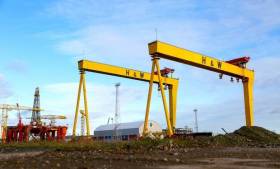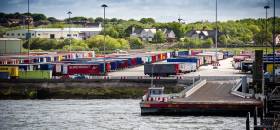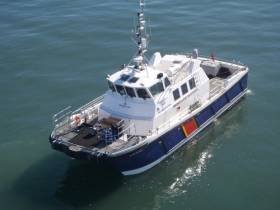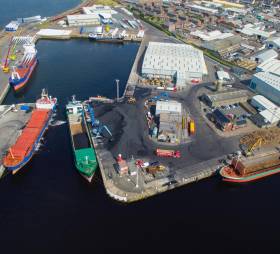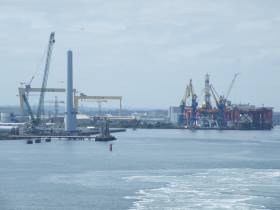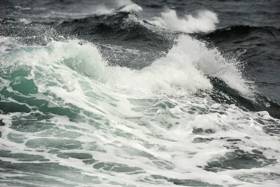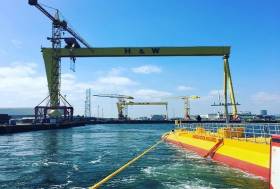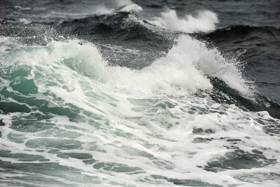Displaying items by tag: Power from the Sea
200 Jobs Secured At Harland & Wolf With 'Multi-Million Pound Contract'
#H&Wcontract - A major manufacturing contract to Harland and Wolff has been secured which the company says will support 200 jobs.
The BBC News writes that the "multi-million pound contract" is with wind farm developer Scottishpower Renewables.
The engineering firm is to make 24 steel foundation jackets for wind turbines to be used in the North Sea. The work will take two years to complete.
Harland and Wolff said the new contract is "very significant for Belfast".
It added that the structures, at more than 65m tall, will almost be as "prominent in the Belfast skyline as the famous Samson and Goliath cranes".
Harland and Wolff stopped shipbuilding in 2003 and its more recent work has included refurbishing oil rigs.
In March, it announced 60 jobs were to go because of a downturn in the offshore oil and gas sector.
Accounts for last year show it had made a profit of £1m and described market conditions as difficult.
Heysham Port's New Road Link Opens With Plans for Further Development
#PortLinks - Irish Sea and Isle of Man ro-ro operators using Heysham Port, in north-west England, now have a new link road, the Bay Gateway connecting the M6, bypassing congestion in Lancaster, writes Jehan Ashmore.
The Bay Gateway opened on Monday and the new road infrastructure will directly benefit the Lancashire port’s main cross Irish Sea clients, Seatruck Ferries and Stena Line. The Irish Sea's only dedicated unaccompanied freight trailer operator, Seatruck operates to ports in the Irish Republic and Northern Ireland. Stena's freight-only Heysham service concentrates solely to Belfast Port.
Also to benefit the Isle of Man Steam Packet Company whose main year-round route serves Douglas, where seasonal-routes fast-ferry, Manannan will for a second winter lay-up at the Manx capital until at least the end of this year.
In another development at Heysham (Peel Ports Group) has announced they are to invest in a new £10m link-span bridge and fourth berth. This is to accommodate larger ro-ro vessels.
The funding will also see a new pontoon built to support offshore crew transfer vessels, a new port entrance created and various improvements to the port IT and terminal operating systems. Work on the project to expand capacity begins this month and is scheduled to be completed in October 2017.
Port director, David Huck said: “This is a transformational time for Heysham port. Our major investment to increase capacity and flexibility will further strengthen the port’s role as a logistics hub for the region, particularly for services to Ireland and the Isle of Man. We’ve also built in an element of future-proofing, giving us the ability to accommodate projected volumes for many years to come.”
Heysham Port is also the closest to several major offshore infrastructure projects, the proposed National Grid connection of Moorside nuclear power station in Cumbria and the Dong Energy Walney Extension wind-farm.
Wicklow Based Craft Completes Charter in North Sea
#Charter - Alpha Marine, formerly Island Shipping, based in Wicklow, has seen the return of one of its wind-farm support vessels following a survey charter in the North Sea, writes Jehan Ashmore.
The water-jet propelled Island Panther had been working in the Waddenzee, an intertidal zone of the Ems Estuary located between The Netherlands and Germany. Along this coast are the Frisian /Wadden Islands, an archipelago that lies off these countries and stretches as far as Denmark.
Island Panther which also is a crew transfer vessel, was deployed from the Dutch port of Ijmuiden to conduct the survey zone. The 17m craft operated in the ultra-shallow waters of the survey site.
#BusiestDay - On the Firth of Clyde, Scotland is ABP’s Port of Ayr which has recorded one of its busiest days in the last 25 years, with five vessels calling at the port last week.
Overall, it was one of the busiest weeks in Ayr in a generation, with 10 vessels calling at the port last Thursday- four of those for renewable energy projects. The last time the port saw this level of activity was when 1.1 million tonnes of open cast coal was exported through Ayr in 1991.
The UK energy industry currently is transitioning to renewable energy sources, and the boost in ship numbers reflects the growing demand to serve wind farm projects underway in the south-west of Scotland.
Thursday’s record day saw the port become a hub of activity with five ships calling in Ayr, each accommodating different cargoes such as onshore wind turbine components, coal exports and timber discharge.
Below are the following vessels involved in wind turbine components delivered for three separate renewable energy projects:
• The MV Abis Bergen and MV Fehn Pollux delivered wind turbine blades for the Brockloch Rig wind farms;
• The MV Arctic Rock arrived with wind turbine blades for the Dersalloch wind farm; and
• The MV Dragonera delivered tower sections and the nacelle for the Minnygap wind farm.
Port Manager for Ayr and Troon Stuart Cresswell said: “Along with our traditional agribulk and mineral business, the wind turbine contracts we have secured this year have provided a fantastic boost to the port and all our local supporting contractors and suppliers.”
ABP Short Sea Ports Director Andrew Harston said: “Following our success in supporting additional cruise calls this year, we are now actively supporting the development of more renewable power in south-west Scotland.”
“The location of ABP’s Ayrshire ports places them in close proximity to these onshore wind farms. The Ports of Ayr and Troon (see: closure confirmed of Larne, Northern Ireland ferry service) are equipped and ready to work with renewable energy companies to serve their projects.”
“This has been a strong period for our two Scottish ports. ABP is continually investing in the ports to underpin the important regional role they fulfil in serving the needs of the Ayrshire region and the west coast of Scotland.”
Across the Associated British Ports Group, ABP has over 30 years’ experience serving the UK onshore and offshore renewable energy industry.
The ports group have been involved in a range of renewable energy projects across Britain including: the Walney Extension wind farm development off Barrow-in-Furness (see recent largest cruiseship call) Galloper wind farm project serviced from ABP Port of Lowestoft and the Green Port Hull development with Siemens in the Humber.
Large Heavylift at H&W for Repairs Following Wind Farm Project
#HeavyLiftVessel - Dutch marine speciliat, Van Oord's heavy lift-vessel, HLV Svanen arrived recently to Belfast Harbour, following installing the final wind turbine foundation at the Burbo Bank Extension wind farm in Liverpool Bay.
The 1990 built heavy lift installation vessel is moored at Harland and Wolff's Commissioning Quay. The sheerleg catamaran craft is to undergo repairs and outfitting at the marine engineering facility and shipyard, ahead of its next contract.
The HLV is taller than H&W's gantry crane Samson, which stands at 106m from the rails. Svanen has an impressive maximum lift capacity of 8,700 tonnes (excluding rigging; 8,200 tonnes including rigging).
To put this into perspective, the metal structure of the Eiffel Tower weighs 7,300 tonnes!
#MostPowerful - The world’s most powerful wind turbine blades continue to ‘breeze’ into Belfast Harbour, as part of a project to develop the Burbo 2 offshore wind farm on the Irish Sea as previously reported on Afloat. The blades – plus their 88m high towers are visible from across much of the city.
The first six massive 80m long blades – the equivalent length of nine double decker London buses – have arrived in Belfast Harbour’s offshore wind terminal from the Isle of Wight. The completed wind farm will provide enough renewable electricity for 230,000 homes.
Each blade weighs 35 tonnes and the turbines, which will be assembled in Belfast Harbour, will ‘sweep’ an area larger than the London Eye (21,124 sq m). During this phase of the project, 32 turbines will be assembled in Belfast. The blades are manufactured in the UK by MHI Vestas Offshore Wind.
After the turbines are assembled in Belfast they will be transported on a state-of-the-art jack up vessel which will install them on the seabed, just off the coast of Liverpool. The wind farm will cover 40km2, the same area of almost 6,000 Premiership football pitches.
Once operational, the tip height of the blade and turbine will be almost 200m. The record level of energy produced from just one turbine in a 24-hr period is 192 MWh – the same amount of energy produced by 22,600 litres of oil.
The blades, which were designed, tested and manufactured at the MHI Vestas on the Isle of Wight, will be the first UK built blades to be installed at a British offshore wind power plant.
Burbo 2 Wind-Farm Blades Arrive in Belfast Harbour
#WindFarm - Blades for a wind-farm in the Irish Sea have begun to arrive in Belfast Harbour reports ReNews.
The blades are for the MHI Vestas V164 8MW turbines destined for Dong Energy’s 256MW Burbo 2 offshore wind-farm in the Irish Sea.
The 80-metre blades for the 32 machines have been manufactured at MHI Vestas's factory on the Isle of Wight.
The turbines will be loaded out in September by A2Sea.
Bladt Industries and EEW are responsible for the project’s foundations, which are currently being installed by Dutch company Van Oord.
#GalwayBay - A public information evening will take place in Spiddal this Tuesday 14 June on the Marine Institute’s application to upgrade the Galway Bay Marine and Renewable Energy Test Site.
Speakers from the Marine Institute, SmartBay Ireland and the Sustainable Energy Authority of Ireland (SEAI) will give presentations and be on hand for questions answers at the Park Lodge Hotel in Spiddal from 8.30pm till 10.30pm.
As previously reported on Afloat.ie, the evening is being held as part of the consultation process on the lease application for the marine energy prototyping site, which closes on 17 June.
Floating Turbine Departs Belfast Lough
#FloatingTurbine- Scotrenewables an Orkney based developer whose 2MW floating tidal turbine as previously reported on Afloat has departed Belfast Harbour for its Kirkwall headquarters.
ReNews reports that the SR2000 will undergo final checks at Kirkwall before installation at the European Marine Energy Centre’s Fall of Warness grid-connected site.
The 64-metre long device is being towed by Scotmarine’s Orcadia II vessel.
The 550-tonne device has been undergoing trials at Belfast Lough to test its leg actuation system. The trials also replicated tidal flow and tested power take-off functionality.
#SeaPower - A public consultation is underway on the Marine Institute’s application for a foreshore lease to upgrade the Galway Bay Marine and Renewable Energy Test Site.
The Marine Institute has applied to the Department of the Environment, Community and Local Government for a foreshore lease for the site where prototype marine renewable energy technology can be tested at reduced scale to determine viability in an ocean environment.
Observations are invited on the foreshore lease application, which outlines plans to upgrade the current infrastructure and facilitate the deployment of a wider range of marine renewable energy devices and novel sensor technologies at the test site.
The Galway Bay Marine and Renewable Energy Test Site has been in operation since 2006 when it was established by the Marine Institute and the Sustainable Energy Authority of Ireland. The purpose of the site is to allow marine technology innovators to test the viability of small scale prototypes in an ocean environment.
A copy of the application and relevant maps, plans, reports and drawings are available to download HERE from the Department of the Environment, Community and Local Government’s website.
Copies of these documents are also available for viewing at Salthill Garda Station, Spiddal Public Library and Comhlacht Forbartha An Spideal Teo until 5pm on Friday 17 June.
Should you wish to make a submission on the lease applications you should do so in writing, giving reasons, within 21 working days of publication of this Notice (Friday 20 May), quoting ref FS 006566, to the Foreshore Unit, Department of the Environment, Community and Local Government, Newtown Road, Wexford or [email protected]. The closing date for submissions is close of business on Friday 17 June.
The Marine Institute plans to hold a public information evening in early June as part of the consultation process, details of which will be announced in due course.
For further information please contact Alan Berry at [email protected]


























